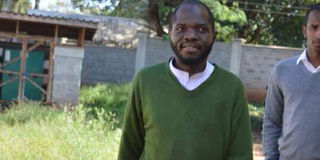Why jailing journalists is a no-no

Kenyan journalist Yassin Juma.
What you need to know:
- When he appeared in court, the Attorney-General ordered his release, saying he had been wrongfully arrested.
- Previous diplomatic attempts to release Juma from prison had borne no fruit.
- Once you have lost your way and detained a journalist, make sure they appear before a judge quickly and don’t deny them bail.
By Tuesday, Kenyan journalist Yassin Juma had clocked nearly 50 days in illegal detention.
When he appeared in court, the Attorney-General ordered his release, saying he had been wrongfully arrested. Previous diplomatic attempts to release Juma from prison had borne no fruit.
In a letter published in Kenyan media on Tuesday, Juma wrote of his harrowing conditions and poor health: “It is my 47th day in detention at Aradar detention cell. It is also my seventh day since I was diagnosed with Covid-19. I am being held at Block W with 68 other Covid-19-positive inmates with no access to medication in overcrowded cells, no running water and no diet to assist us with our condition.”
During the rule of the charismatic, cerebral but infamously iron-fisted Ethiopian leader Meles Zenawi, its prisons were overflowing with journalists. Ethiopia kept some notorious company then, being one of the world’s leading jailors of journalists. After Meles died in August 2012, his successor, Hailemariam Desalegn, was a milder man and didn’t wear big iron studs on the soles of his shoes. But he could barely tame the ruling Ethiopian People's Revolutionary Democratic Front's (EPRDF) authoritarian instincts. He only turned the 'oppressometer' one notch down.
With the country in upheaval, and the EPRDF in convulsion, in a rare move in Ethiopia and in this fair continent, Hailemariam resigned in February 2018. From the ashes, Abiy Ahmed emerged as successor that April. Abiy has taken Ethiopia on a dizzying reformist rollercoaster ride. By the end of 2018, something that hadn’t been witnessed in Ethiopia in over a generation happened: For the first time, there was no journalist in jail.
Two years down the road, Ethiopia has returned to form -- sometimes coming dangerously close to tearing apart at the seams -- with regional and ethnic tensions, and discontent, off the charts.
Abiy still acts like a man committed to a more liberal Ethiopia but he has spent quite a bit of his reformist air miles. He occasionally puts the velvet gloves back in his right pocket and reaches for the handcuffs in the left. Journalists are, again, regular guests in Ethiopia’s prisons, Juma being one of the latest.
Arresting journalists is wrong. It is bad business. Smart governments don’t do it. However, if they are seized by a madness or rage, there is a “clever” way to do so and also a wrong way.
Damages your image
The first rule is, stay away from foreign journalists. It gets people in their home country worked up and, in this age of vociferous social media, every day of their arrest will be counted. It damages your image globally. If you can’t overcome your anti-free media itch, the best thing is to get them, take them to the airport and bundle them on the next flight home. Bad, but on a scale of one to 10 on the enemy of the media list, it puts you at five, not 10.
Secondly, once you have lost your way and detained a journalist, make sure they appear before a judge quickly and don’t deny them bail. Or if, as in Juma’s case, he is granted bail, keep your dogs on a short leash and make sure they don’t grab him off the street again.
Journalists have a loud voice and long reach; so, you want to ensure that when they are heard, they are not complaining of horrible things like Juma. When I was editor of Daily Monitor, in Uganda, I did over 150 trips to court, and to the cells, after annoying the State with our reporting -- but was never once denied bail.
At the lakeside prison of Luzira, in Uganda’s capital Kampala, where journalists are taken for medium- and long-term residence, for a long time there was a section called “The Sheraton”. Journalists were held there. As the name suggests, conditions and accommodations were better than elsewhere. Standards have since deteriorated but the thing about that is that a wise strongman should be mindful to deny journalists a good story, that they will inevitably write or tell when they are eventually released.
There are several less abusive ways to persuade journalists to tread carefully. The story is told of Ghana’s dashing president, Flight Lieutenant Jerry John Rawlings, in the latter years of his rule as he became softer and headed toward opening up to multipartyism in 1992 and had long stopped having people tied to barrels and shot by firing squad.
A foreign delegation arrived in Accra to talk to JJ about human rights. As they waited in the lounge, the TV was on. It showed a wildlife feature in which a lion was hunting down and brutally tearing up other animals for lunch.
The delegation didn’t think much of it -- until they entered his office. Nonchalantly, he told them it’s the natural order of the world that the strong animals eat the small and weaker ones. That’s when they figured the show was deliberate. They got the message. Apparently, he did the same with foreign journalists. They, too, got it.
They really should have stayed off Juma.
Mr Onyango-Obbo is a journalist, writer and curator of the Wall of Great Africans. @cobbo3




